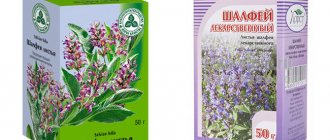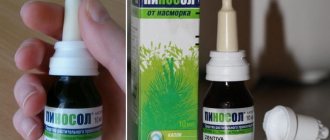Salvia
Is it possible to gargle with sage during pregnancy, and how healthy and safe is such a decoction? This is important for a pregnant woman, because we are talking about the development of the unborn child.
Sage is classified as a medicinal herb, its beneficial qualities are known, but whether everyone can use it needs to be figured out. If before pregnancy a woman boldly used it for ailments, now what restrictions exist?
The healing properties of green sage in the form of decoction and tincture
The sage plant is popularly called salvia. Our ancestors considered it “a remedy for a hundred diseases.” The healing properties of sage are associated with the presence of flavonoids, alkaloids, tannins, phytoncides and essential oils that have bactericidal properties. In autumn, sage is rich in tannins, and during the period of active fruiting, the concentration of essential oils in it increases.
Sage is considered a cure for many diseases
Today, sage is collected as a wild plant, and is also specially cultivated for further use in pharmacology and cosmetology. The leaves are separated from the stem, dried and processed. The upper parts of the plant are also used.
Based on sage, preparations are made to disinfect wounds, relieve inflammation of mucous membranes, and stop bleeding. Salvia is also used as a staphylococcal flora suppressant.
Indications for use:
- gingivitis and stomatitis;
- hyperhidrosis;
- diabetes;
- stomach colic;
- infertility;
- angina;
- catarrh of the upper respiratory tract;
- radiculitis;
- treatment of wounds and burns.
In folk medicine, sage is used in the form of decoctions and infusions. Based on the plant, preparations are prepared that can stop lactation or improve the quality of eggs. It is believed that sage contains phytohormones similar in composition to female estrogen. Therefore, it is prescribed for the treatment of infertility, relieving discomfort during menopause or severe premenstrual syndrome.
Why you shouldn’t use sage during pregnancy
In the article we discuss sage during pregnancy. We tell you whether you can drink it and gargle, whether inhalations with it are allowed, and in what doses it is harmful. You will find out why it is dangerous, reviews about its use from doctors and expectant mothers.
What is sage
There are 2 types of sage: medicinal and meadow.
Salvia officinalis is a perennial herbaceous plant. All parts of the plant contain essential oils, and the raw materials are leaves or flowering tops.
The plant has a disinfectant, astringent, hemostatic, softening and diuretic effect. It also actively copes with increased sweating and, like chamomile, has an anti-inflammatory effect.
Taking sage orally during pregnancy is prohibited
Meadow sage does not have similar properties, so in folk medicine it is the medicinal form that is used.
All these beneficial properties are due to the rich chemical composition, which includes:
- vitamins of group A;
- B vitamins;
- acids: nicotinic, ursolic, ascorbic and oleic;
- tannins;
- flavonoids;
- alkaloids;
- essential oils;
- micro- and macroelements: iron, selenium, zinc, sodium.
Application
Medicinal sage is used as follows:
- in the form of a tincture or decoction - for rinsing the throat and mouth as an astringent and antiseptic for stomatitis, sore throat, bleeding gums, as well as for douching for gynecological diseases;
- inhalation with decoctions or sage oil - used for inflammation of the upper respiratory tract;
- Decoctions are used externally for hair loss, and together with elderberry flowers - for the treatment of hemorrhoids.
Release form
Modern pharmacological companies produce sage not only in the form of dried herbs for making decoctions or tea, but also in the form of medicinal tablets, lozenges and lozenges. In addition to sage extract, essential oils are also added to the composition of such preparations to improve the overall effect.
It is these substances that form the basis of lollipops and lozenges, but to give them shape, as well as a special taste, auxiliary substances are added during their production, in particular:
- lemon acid;
- ascorbic acid;
- Apple acid;
- magnesium stearate;
- various chemical elements;
- sorbitol
To give a sweet taste in the production of tablets, sorbitol is used instead of sugar, which is a sugar substitute.
This approach allows the use of tablets and lozenges to treat people with diabetes, since their use does not increase blood sugar levels.
But not all companies do this, and some types of tablets contain natural sugar, so before use you should carefully read the instructions for the product.
Sage lozenges are an effective remedy for eliminating the symptoms of flu, sore throat and other diseases of the upper respiratory tract. But, in addition, lozenges and lozenges, as well as lozenges, can be used to treat stomatitis, inflammation of the gums and oral cavity.
Properties of the drug
Despite the extensive list of diseases in the treatment of which sage is used, tablets, lozenges and lozenges are most often used to eliminate ailments of the respiratory system, since such remedies have:
- Pronounced antimicrobial and antiseptic effect. When a lollipop or tablet is dissolved in the human oral cavity, a high concentration of the main active substances is formed, which helps to reduce the activity of pathogens, while reducing their concentration.
- Anti-inflammatory effect. Resorption of the drug eliminates redness of the throat, reduces swelling of tissues, and significantly reduces pain in the throat, trachea and larynx.
- It has an expectorant effect, which perfectly relieves dry coughs, while softening and protecting the mucous membranes of the mouth and larynx from irritation.
- Pronounced astringent effect.
But despite such a long list of beneficial properties, sage is contraindicated during pregnancy! Next, let's figure out why.
The pharmacy sells herbal raw materials consisting only of sage herb. Its basis is crushed leaves with a small addition of petioles, flowers and stems. This sage has a green-gray or green-brown color and a pronounced aroma. The dried plant is sold in packs of 30 to 300 grams, as well as in portioned filter bags of 1.5 g each, intended for brewing tea.
Separately, you can purchase lozenges and lozenges, which are classified as antiseptics. Such preparations contain dry extract, as well as oil extracted from sage. They add sugar, flavorings, dyes, sorbitol and other substances to make the lollipops and tablets taste good.
In addition, there are preparations in which sage is present only as one of the active substances, for example, the “Stomatofit” solution, which acts on the oral mucosa due to extracts of thyme, chamomile, mint, oak bark, sage, calamus and arnica. Another herbal remedy containing sage, string, marigold, eucalyptus, licorice and chamomile is Elekasol.
Sage herb is rich in vitamins:
- groups A, B, C;
- nicotinic acid;
- tannins;
- essential oils;
- alkaloids;
- zinc;
- iron;
- sodium and selenium.
Its medicinal properties are simply irreplaceable for the treatment of infectious and inflammatory diseases of the oral cavity and upper respiratory tract.
In addition to the fact that the plant is used for sore throats and sore throats, it is also used to treat:
- stomatitis;
- tonsillitis;
- gingivitis;
- periodontal disease;
- laryngitis.
Women will be interested to know that sage is widely used in medical practice when planning pregnancy. The high amount of natural estrogen in the herb significantly increases a woman's chances of becoming pregnant. A specially prepared decoction for this purpose is taken according to a special regimen under the strict supervision of the attending physician.
In pharmaceutical products, sage is available in different dosage forms:
- lozenges;
- lollipops;
- lozenges;
- dried raw materials;
- tincture;
- tea bags.
Depending on the disease, one or another medicinal form of the plant is used to increase its bioavailability in the body.
Almost all women, without exception, are interested in issues of beauty and longevity. Who doesn’t want to feel and look young and beautiful for as long as possible.
Modern cosmetology has many ways to combat age-related changes - from all kinds of special age-related creams and beauty injections to surgical interventions. However, trips to beauty salons are not affordable for everyone, or they simply don’t have the energy or time to do them.
In this case, the Geratone biolift face perfect device, developed by modern scientists in the field of beauty, will come to your aid. Thanks to the use of two methods of influence (electromyostimulation plus red spectrum light and phototherapy) on the skin, it works incredible miracles! And no operations!
Electromyostimulation tightens muscles and thereby smoothes the skin, and also eliminates wrinkles and allows you to tighten the contour of the face. The action of the red spectrum is to stimulate the production of collagen by the body's own cells.
When using the Geratone device for eight weeks, the elasticity and firmness of the skin significantly improves and an amazing rejuvenation effect occurs! The device is available to everyone, as it can be purchased without a prescription and even ordered by mail. The cost, in comparison with trips to professional beauty salons, will pleasantly surprise you.
Is it possible to drink sage during pregnancy?
Since ancient times, medicinal sage has been valued by folk medicine as a cure for all ailments. It has a wide range of effects. Sage is still used when planning pregnancy, being a surefire remedy in the fight against infertility.
The herb has anti-inflammatory, emollient, hemostatic properties.
Useful properties of the plant
Most often this plant is used for:
- cold;
- nervous system disorders;
- diseases of the gastrointestinal tract;
- upper respiratory tract infections.
Sage is effective when planning pregnancy due to its high content of phytohormones, designed to normalize a woman’s hormonal levels. Also, this herb has a slight androgenic effect, reduces the amount of milk production in a woman who has given birth, helping her complete the lactation period when the right moment has arrived.
In case of infertility, the “plant of life” acts as follows:
- normalizes the menstrual cycle;
- relieves menstrual pain and cramps;
- increases the thickness of the endometrium;
- accelerates the growth of follicles;
- strengthens the functioning of the ovaries;
- increases sexual desire.
But how is sage useful during pregnancy if the long-awaited baby is already on the way to development in the mother’s tummy? Its action is as follows:
- helps effectively fight infectious diseases of the oral cavity;
- helps treat a sore throat for colds or sore throats;
- relieves swelling of the legs and fights varicose veins.
Contraindications and side effects
Even though sage preparations are of natural plant origin, there are a number of contraindications for their use, in particular:
- individual intolerance to the plant or hypersensitivity;
- presence of diabetes mellitus - people with this disease should carefully read the instructions and choose products that do not contain natural sugar;
- children under 6 years of age - tests of tablets and lozenges have not been carried out in this age group, so the effectiveness of the action has not been proven;
- pregnancy – the period of bearing a baby is a direct contraindication for taking medications with sage;
- lactation period.
You should not prescribe such drugs yourself, because modern pharmacology offers a sufficient list of various medications that do not pose a threat to the preservation of pregnancy and fetal development.
And of course, before using any drug, you should consult a doctor.
Although the medicinal properties of sage cannot be doubted, the components included in its composition cannot be called absolutely harmless. But in general, if you do not overdo it with concentration, the herb has virtually no negative effect on the body.
However, the instructions for this drug contain a categorical prohibition for pregnant women to take it orally, especially in the early stages of pregnancy (1st trimester). The hormones contained in the herb can cause contractions of the uterus and thereby trigger premature labor.
Uterine bleeding may also occur, which will also lead to undesirable consequences. In addition, the use of decoctions, infusions, tea, tablets from the 14th to the 30th week (2nd trimester), as well as in the last stages, can cause premature birth or even cause rejection of the placenta.
Therefore, you should carefully consider all the possible risks associated with ingesting sage. Despite this, many doctors still recommend sage to pregnant women for colds, given its natural origin, uniqueness and effective effect on the sick body.
External use of this valuable plant is quite acceptable. If the expectant mother has severe sore throat or the infection has progressed to a purulent process, in such cases, gargling with sage decoction will be an excellent solution to the problem.
Possessing a natural antimicrobial effect, it will be an excellent alternative to antibiotics. When gargling, you should never swallow it. During pregnancy, it is also allowed to inhale with a herbal solution to eliminate bronchospasm.
Is it possible to gargle with sage during pregnancy?
Not much lately, but I have a sore throat and a runny nose. It seems like a common cold, but I’m pregnant and don’t want to take the medications that used to help. A friend recommended sage, but I read the reviews and doubted its usefulness. Is it possible to gargle with sage during pregnancy?
You are completely right in your desire to refrain from using various types of drugs. Pharmacy medications, of course, can relieve the problem of painful sensations in the throat, but at the same time, a more significant deterioration in your condition and health in general is possible. As they say, pregnancy is a delicate matter. A weakened immune system is inevitable, and you must be prepared for the body’s increased susceptibility to all kinds of viral infections and illnesses. Taking care of yourself and the baby in your womb is your main task during this special period for every woman. As for sage, it really has a number of beneficial properties, including a beneficial effect on a sore throat. Therefore, despite all the positive or negative reviews you have read, this herbaceous plant is quite acceptable for rinsing the mouth. Pregnancy is not an obstacle to this process, and sage, in turn, does not pose any threat to the normal development of the fetus. But with all the arguments speaking about the acceptability of this method of treatment, one should not forget about the dosage and characteristics of one’s own body.
For rinsing to be effective, you need to steep a tablespoon of chopped herbs in 200 milliliters of boiling water for half an hour. After 30 minutes, when the water has cooled and is saturated with all the beneficial substances of sage, the resulting mixture can be used to treat the throat, after carefully filtering it. This volume of infusion will be enough for you for exactly 1 day - that’s 2-3 rinses. There is simply no point in more. Often this procedure does not cause absolutely any discomfort and at the same time has a beneficial effect on a sore throat. But if you find it unpleasant, and the body reacts negatively in some way, then it is better to refuse to use sage. It is possible that the body may not accept this plant individually, which can be expressed in a burning sensation in the mouth, an unbearable feeling of bitterness or nausea. And the point here is not so much about pregnancy, but about the characteristics of the body. In this case, it is better to resort to other methods of treatment that are more pleasant for you personally. If we talk about rinsing, it can be a solution based on sea salt, which is considered no less effective than sage.
Is it allowed for expectant mothers?
Since many medications are prohibited during pregnancy, expectant mothers often prefer what they consider to be safer herbal preparations, decoctions and tinctures. However, with regard to sage, this can be an unforgivable mistake, because such a plant has properties undesirable during pregnancy.
- In the early stages, sage can prevent the fertilized egg from implanting into the wall of the uterus, because it reduces the level of the hormone progesterone, which is important for supporting pregnancy. Sage infusions are often used to stimulate ovulation, since this herb is a source of phytohormones. But in this case, it is important to stop taking it in the second half of the cycle.
- Taking sage may cause uterine bleeding, which threatens miscarriage. In addition, under the influence of such a plant, contractions of the uterus occur or intensify, so in the first trimester, sage can cause a miscarriage, and the use of a decoction, tea or infusion in the second or third trimester can provoke labor ahead of schedule.
- Sage can cause an increase in blood pressure, which is especially dangerous if a woman already has symptoms of hypertension or preeclampsia has begun in later stages. In addition, such a plant threatens the development of blood thickening, thrombosis, placental insufficiency and fetal hypoxia, as it disrupts blood circulation in the blood vessels of the placenta.
Use of sage during pregnancy
Sage is a herbaceous plant that has become famous for its healing properties. Many women wonder if pregnant women can use sage. To get the answer, you need to study the effect of the plant on the body.
Can sage be used for pregnant women?
Since most medications are not prescribed during pregnancy, women have to use herbal remedies. One of them is sage, which has the following therapeutic effect:
- anti-inflammatory;
- antiseptic;
- astringent;
- antipyretic;
- hemostatic;
- diuretic (diuretic);
- laxative;
- antimicrobial.
The plant improves reproductive function, restores the cycle of ovulation and menstruation. Therefore, it is often prescribed in preparation for conception and fertility disorders. Do this in 1 half of the cycle. Otherwise, the fertilized egg will not be able to attach to the wall of the uterus.
Sage can be used when carrying a child, but only externally. Decoctions, infusions, teas and lozenges are not used even if indicated. To understand why the plant should not be consumed during pregnancy, you need to look at its composition.
The grass contains hormones that cause the uterus to contract and lead to various complications - fetal loss, premature birth, placental insufficiency, disturbances in the development of the child, and the appearance of hypertension.
Before using sage during pregnancy, you should consult your doctor.
In the early stages
At the beginning of pregnancy, special care must be taken, because at this time the embryo attaches to the uterine mucosa. Even minor contractions of the organ can cause fetal rejection or the development of internal bleeding, which will lead to spontaneous abortion.
Contraindications and side effects
Those who drank sage during a 9-month period generally speak positively about this medicinal plant, focusing on the strict adherence to the recommendations and instructions of their doctor. In any case, contraindications exist and they apply to those who are intolerant to the main or auxiliary components of the herb.
If the question arises of how to treat your child’s throat, then you should strictly adhere to the instructions, which indicate that children under 3 years of age are not recommended to use sage-based medications. Their price is low, which cannot but please potential users.
Beneficial features
Sage leaves are rich in various compounds, including tannins, vitamins P, B, C, A, ursolic acid, flavonoids, essential oils, phytoncides and other substances. Thanks to this composition, sage-based medicines can:
- reduce the activity of inflammation by reducing the permeability of cell membranes and vascular walls;
- inhibit the vital activity of pathogenic bacteria, some viruses and harmful fungi;
- influence the mucous membranes, resulting in the formation of a surface protective layer (this action is called astringent);
- promote mucus separation and relieve cough.
How and when can it be used during pregnancy?
External treatment with infusions and decoctions is used for skin diseases. If the expectant mother begins to have eczema or develops dermatitis, she can use compresses for which a decoction of sage is prepared. Applications of the infusion help with wounds that do not heal for a long time. For swelling of the legs or arms, as well as varicose veins, you can also do foot baths. Usually, to alleviate the condition and relieve fatigue, it is enough to soak your feet in a warm sage decoction for about 10-15 minutes.
Rinsing the mouth with sage is in demand for various dental diseases. They help remove the unpleasant symptoms of stomatitis and alleviate pain from gum inflammation. For procedures, use 1/2 cup of warm infusion. The frequency of rinsing can be up to 5 times a day, and the duration of treatment is about a week.
Gargling with sage is prescribed for inflammation in this area, as well as for coughing. The plant helps to quickly cure laryngitis, tonsillitis and similar diseases. The manipulation is performed with 100 ml of infusion, which should be slightly warm. You should gargle 3-5 times during the day, and the duration of therapy should be checked with your doctor.
Another way to use sage for coughs is inhalation. They soften the mucous membrane of the throat and help eliminate dry cough. The procedures are carried out using a steam inhaler or a regular saucepan (but not in a nebulizer). After brewing some dry sage, breathe in the steam for about 10 minutes.
Using sage to treat inflammation in the mouth and throat
Although the medicinal properties of sage cannot be doubted, the components included in its composition cannot be called absolutely harmless. But in general, if you do not overdo it with concentration, the herb has virtually no negative effect on the body.
However, the instructions for this drug contain a categorical prohibition for pregnant women to take it orally, especially in the early stages of pregnancy (1st trimester). The hormones contained in the herb can cause contractions of the uterus and thereby trigger premature labor.
Uterine bleeding may also occur, which will also lead to undesirable consequences. In addition, the use of decoctions, infusions, tea, tablets from the 14th to the 30th week (2nd trimester), as well as in the last stages, can cause premature birth or even cause rejection of the placenta.
Therefore, you should carefully consider all the possible risks associated with ingesting sage. Despite this, many doctors still recommend sage to pregnant women for colds, given its natural origin, uniqueness and effective effect on the sick body.
External use of this valuable plant is quite acceptable. If the expectant mother has severe sore throat or the infection has progressed to a purulent process, in such cases, gargling with sage decoction will be an excellent solution to the problem.
Possessing a natural antimicrobial effect, it will be an excellent alternative to antibiotics. When gargling, you should never swallow it. During pregnancy, it is also allowed to inhale with a herbal solution to eliminate bronchospasm.
Colds and acute respiratory viral infections also occur in pregnant women. The immune system, especially in the early stages, is suppressed, and the expectant mother can easily get sick. When choosing a treatment method, it is necessary to evaluate not only the healing properties of the drug, but also its possible negative effect on the body.
We suggest you read: Is it possible to get money back for rights?
Permitted methods of consuming sage include its external use during pregnancy. It is useful to take baths - they have a relaxing effect on tired legs and help with varicose veins.
The use of herbal preparations for the skin is highly effective, especially in the presence of rashes or minor damage. Such products have an antimicrobial and healing effect, help relieve pain and eliminate dryness.
It is recommended to use sage on the skin in the form of lotions or special creams. Before use, be sure to read the instructions and follow them exactly!
The spicy, pleasant aroma of sage can be used to scent the air in a room. It will help relieve fatigue and improve sleep for a pregnant woman.
The uses of this herbal remedy are multifaceted. Sage is an excellent helper in the fight against many ailments, but during pregnancy the safety of the unborn child comes to the fore. Therefore, sage should be used exclusively as prescribed by a doctor and in cases where its use is not contraindicated (externally). Never start with self-treatment; any question of using medicinal herbs requires consultation with your doctor.
Recipes
To properly make a decoction of sage, which during pregnancy, we remind you, is used only externally, take 1-2 tbsp. spoons of dry leaves and 100 ml of water. After pouring the leaves into a pan and filling them with water, place the container on the fire, allow the liquid to boil, and then cool. After soaking gauze in the prepared broth, it is applied to the inflamed areas 2-3 times a day.
To prepare a water infusion, use 1 tbsp. spoon of vegetable raw materials and 200 ml of water. The ingredients are placed in a water bath for about 15 minutes. Having cooled the solution and filtered it, add enough water so that the resulting volume is 200 ml. If you use filter bags, then pour 3-4 bags with 100 ml of boiling water, leave for 15 minutes, squeeze them well and add water to make 100 ml of infusion.
Sage: chemical composition
Sage (salvia) is a perennial medicinal shrub with a strong aroma. There are many varieties of this plant. Salvia officinalis is widely used for runny nose, throat diseases, and cough.
The branches of the plant contain aromatic oil, which includes the following substances:
- cineole - antiseptic and expectorant;
- camphor - analgesic, emollient;
- Salven is a plant antibiotic;
- borneol - helps with skin diseases, cuts and bruises;
- pinene - has anti-inflammatory activity.
Sage has long been considered a cure for all diseases.
Salvia contains many trace elements:
- potassium;
- calcium;
- iron;
- magnesium;
- mineral salts;
- vitamins.
A unique set of elements determines the medicinal qualities of this shrub.
conclusions
If it so happens that while carrying a baby you contract a rotavirus infection, try not to abuse medications when treating it. It is better to use traditional medicine, which includes healing sage.
At the same time, it must be remembered that this medicinal herb should be used by pregnant women with great caution, especially during the period of fetal formation. I thank everyone who reads us and wish you to have as few health problems as possible. See you!
Sincerely, Katherine Grimova, mother of a wonderful daughter!
Prevention measures
It is very important for a pregnant woman to follow all medical recommendations that are aimed at preventing infectious processes in the throat and respiratory diseases.
Nonspecific prevention measures are as follows:
- a woman should avoid any places with large crowds of people, as well as closed groups, especially during a seasonal epidemic;
- at the first symptoms of a cold, you need to call your local doctor to your home, and not go to the clinic yourself;
- when going outside, you need to use sterile masks (they should be changed regularly);
- you should not be in contact with patients with respiratory viral infections and other infectious diseases transmitted by airborne droplets, avoid hugging and kissing them;
- for the purpose of prevention, it is recommended to carry out hygiene of the nasal cavity and throat with a solution of sea salt daily or once several days (it is prepared independently or purchased at the pharmacy);
- the room in which a pregnant woman stays must be regularly ventilated, and it is also important to carry out wet cleaning;
- It is recommended to take vitamin complexes suitable for pregnant women in preventive dosages;
- To strengthen the immune system, healthy sleep and proper rest play an important role.
A woman should always eat a full and balanced diet, maintain a healthy lifestyle and spend enough time in the fresh air











